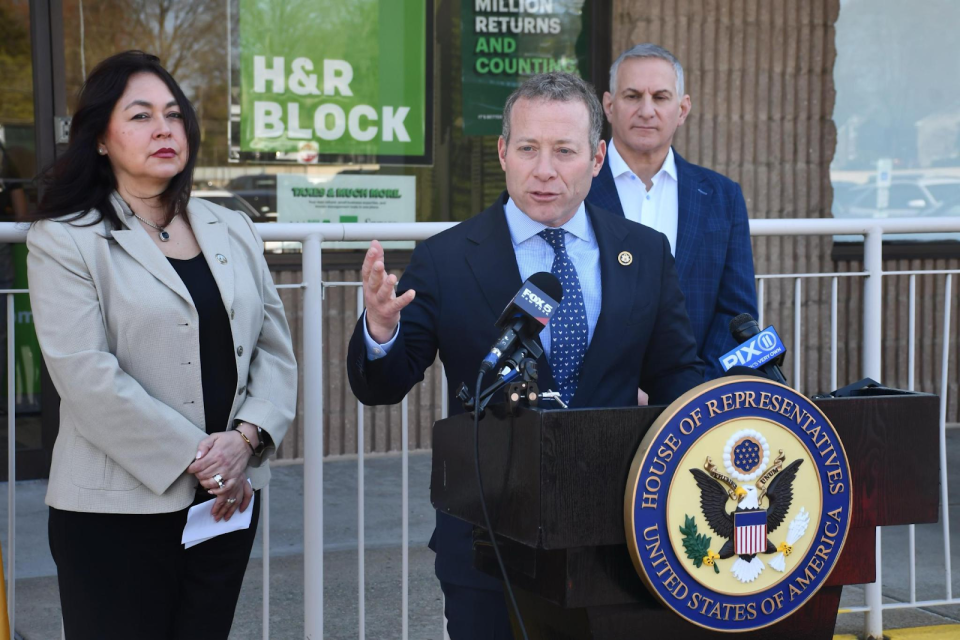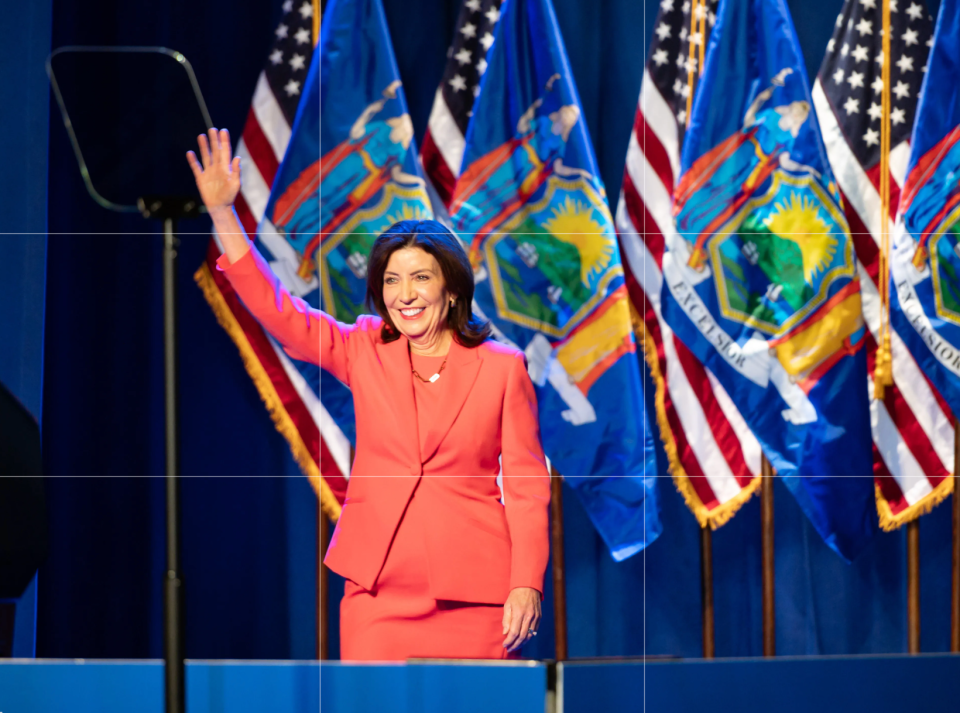In NYC congestion pricing fight, suburban voters trumped infrastructure investment | Kelly
- Oops!Something went wrong.Please try again later.
If you want to understand why the massive, multi-billion-dollar congestion pricing toll plan to fix New York City’s transit system crashed in a giant bureaucratic heap last week, it’s helpful to turn back the clock to a Thursday 17 months ago.
Jan. 19, 2023 was an otherwise ordinary day except for the two men who met for a joint press conference on a rain-soaked corner in Fort Lee, New Jersey.
Rep. Josh Gottheimer, a New Jersey Democrat, and Rep. Mike Lawler, a New York Republican, were on opposite sides of America’s often impenetrable political fence, not to mention residents of states that don’t always work well together. But on that January day, with the steel towers of the George Washington Bridge in the background, a billboard advertising “everything orthopedic” looking down and a tractor trailer delivering “Asian Food” passing by at one point, they seemed like old friends.

Gottheimer's home in Wyckoff, New Jersey, is a mere 11 miles from Lawler’s in Pearl River, New York. They conceded they shared a strong common bond that transcended partisan politics or state boundaries. Both represented large suburban Congressional districts with plenty of New York City-bound commuters. Huddling under matching blue umbrellas in Fort Lee that day, both announced they were joining forces to block a plan to impose a special toll on anyone trying to drive into midtown Manhattan.
It was the beginning of the end for the multi-billion-dollar plan known as congestion pricing that would impose as much as an extra $15 toll per trip on commuters’ cars.
There are many ways to view the collapse of the congestion pricing plan. But examining this set of complicated issues through the eyes of Gottheimer and Lawler offers a unique — and perhaps instructive — perspective.

'Indefinite pause'
In a stunning reversal last week, New York’s Gov. Kathy Hochul, a Democrat who bills herself as a practical politician with her ear to the ground and its occasional groundswells of voters, ordered transit officials to “indefinitely pause” the extra commuting tolls, which were scheduled to begin on June 30. Which means the issue is likely to be resurrected at some point. For now, it's in limbo, though.
Hochul, who had championed the plan as a way to raise $1 billion to underwrite a $15 billion borrowing plan to pay for desperately needed upgrades in New York City’s subways, explained that “after careful consideration I have come to the difficult decision that implementing the planned congestion pricing system risks too many unintended consequences.”
The sound you heard across New Jersey, New York and even Connecticut and Long Island and New York City itself was a loud: “What?”
Explaining her change of mind, Hochul cited that she had come to believe that congestion pricing tolls — estimated at as much as an extra $5,000 a year for some commuters — would be a heavy financial burden on working-class families. In addition, she suggested that the tolls would add even more pressure on New York City’s economy, which was just barely beginning to recover from the impact of the coronavirus pandemic.
“Let’s be real,” Hochul said, “a $15 charge (per car) may not seem like a lot to someone who has the means, but it can break the budget of a hardworking middle-class household.”

In their first meeting on that Fort Lee sidewalk in January 2023, Gottheimer and Lawler both cited these kinds of kitchen-table concerns. It took time, but it seems Hochul finally listened and agreed.
As much as cold, hard cash in the pockets of budget-conscious workers seemed behind Hochul’s reversal, another factor she didn’t mention was clearly cold, hard politics. The powerful police and teachers' unions — with their voters — voiced loud disapproval of congestion pricing, claiming it would overly burden them as they drove to jobs in midtown Manhattan.
What’s more, Hochul faced the prospect of battling eight bitterly politicized lawsuits, ranging from one brought by New Jersey Gov. Phil Murphy to others by coalitions of truckers and small businesses in midtown Manhattan who claimed they would have to pay extra costs for deliveries.
For Hochul — and apparently other Democrats — a clear worry from congestion pricing was the possibility of angering suburban voters represented by Gottheimer, whose district includes parts of Bergen, Passaic and Sussex counties, and Lawler, who represents all or parts of Rockland, Westchester, Putnam and Dutchess counties. With the suburbs potentially dominating the outcome of the fall elections, Hochul reportedly did not want to take any chances of losing support for her party.
But in playing such a political wild card — and doing it as the clock ticked stridently toward the commuter toll hikes — Hochul essentially threw into chaos a decades-long effort to raise new funds for subway upgrades and other mass transit fixes as well as dramatically reduce the number of cars and pollution in Manhattan.
In just a few brief sentences of a dry, bureaucratic statement, Hochul managed to raise the collective tempers of environmentalists, transit advocates, city planners and economists.
Not Gottheimer and Lawler, though. In separate interviews this week, both cheered Hochul’s decision — with a note of caution that the battle over congestion pricing tolls is not entirely over.
The power of suburban votes trumps infrastructure investment
Which brings this story back to that meeting between Gottheimer and Lawler on the rain-soaked corner in Fort Lee in January 2023.
Both men are ambitious. Both want to offer significant leadership in their respective political parties. Both are articulate. And both are core members of the bipartisan House coalition known as the Problem Solvers Caucus, which bills itself as trying to fashion practical compromises to break legislative gridlock in Washington, D.C.
In some ways, the defeat of congestion pricing is an outgrowth of their bipartisan work. But in another way, it’s also a reminder of how difficult it can be now in America to pull together the political, civic, financial and legal support needed for major infrastructure projects.
It’s also a reminder of the power of suburban voters — especially in the middle-class towns that dot the landscape of northern New Jersey where Gottheimer draws his political strength and the New York communities of Rockland, Westchester, Dutchess and Putnam counties where Lawler has become a formidable force since his election to the House in 2022.
Both Gottheimer and Lawler cited economics — and the worry over wasteful spending — as key factors in their opposition to congestion pricing. Indeed, both pointed to the fact that the Metropolitan Transit Authority has projected this year that it will lose $700 million in revenue on the nearly 14% of subway and bus riders who refuse to pay fares. With that sort of lax budget management, both questioned why the MTA should be given a $1 billion cash infusion from congestion pricing just to begin its subway upgrade program?
“I am sympathetic to the demands for mass transit,” Gottheimer said. “I believe deeply in mass transit. But at the same time, you have to run your shop well. Don’t look to others to clean up your messes.”
Lawler called the MTA’s efforts to impose congestion pricing a “cash grab” that is opposed by 80% of voters in his House district. He labeled the MTA “corrupt” and blamed it for “squandering billions in taxpayer money.”
More: NYC congestion pricing advocates plan lawsuit to keep Hochul from halting toll
“Let’s start with $700 million in fare jumping,” Lawler said.
'A whole different world'
Such is just one piece of the opposition that Gottheimer and Lawler raised in questioning the MTA’s financial management.
Another is the fact that New York City’s transit officials essentially ignored the needs — in some cases, pleas — of the suburbs when the congestion pricing scheme was hatched.
For example, while New Jersey commuters would pay heavily for driving into Manhattan — for work or just to attend a Broadway show — New Jersey’s mass transit system would receive no funding from congestion pricing.
The lack of a wider approach to mass transit upgrades was not lost on the analysts from the highly respected Regional Plan Association.
In an interview with The Record and the USA Today Network after Hochul’s decision to postpone the start of congestion pricing, the association’s executive vice president, Kate Slevin, said that while she preferred a region-wide approach to transit planning that included massive upgrades to service in Upstate New York, Long Island, New Jersey and Connecticut, she nevertheless saw congestion pricing revenues as the start of a much-needed influx of cash to New York City’s century-old subways.
“Congestion pricing makes sense,” Slevin said. “It raises revenue and reduces air pollution and manages traffic.”
But she cautioned: “The reason something controversial like congestion pricing is being implemented is because there are not a lot of alternatives. There are only so many sources of revenue — from federal and state governments, from new taxes and new fees.”
In the end, the drawbacks to congestion pricing became a massive political burden.
“We had to get this right,” said New York Mayor Eric Adams in remarks this week about the plan that seemed more like a hope for the future as much as a comment on the past.
“I was very clear from the start: We have to get it right, I’m still with that,” Adams added. “We should deliberate and make sure we get it right.”
So, what exactly is right?
What Adams and Hochul now face is a reality that Gottheimer and Lawler seemed to sense as they examined the impact of congestion pricing in January 2023. It’s expensive. It’s burdensome to anyone who needs to drive a car or a truck. That includes teachers and nurses driving to work in New York City as well as those who deliver food to restaurants.
But the COVID-19 pandemic changed New York City economy — to the point that the city is still struggling to lure office workers back to empty buildings. At the same time, congestion pricing has succeeded in reducing traffic and increasing revenue in London and Singapore.
So why not New York City?
Maybe the answer to that question lies in the kinds of suburbs that Gottheimer and Lawler represent.
At Long Island’s Hofstra University, where he runs the National Center for Suburban Studies, Lawrence Levy says the solution will come from those who understand how the political and economic landscapes have changed.
“Congestion pricing is real,” Levy said. “It works in terms of reducing congestion and generating revenue for alternatives to the automobile. There’s no question about that. But congestion pricing was approved before the pandemic. We’re now in a whole different world.”
That new world has put the brakes on congestion pricing.
For now, anyway.
Mike Kelly is an award-winning columnist for NorthJersey.com, part of the USA TODAY Network, as well as the author of three critically acclaimed nonfiction books and a podcast and documentary film producer. To get unlimited access to his insightful thoughts on how we live life in the Northeast, please subscribe or activate your digital account today.
Email: kellym@northjersey.com
This article originally appeared on NorthJersey.com: NYC congestion pricing plan upended by suburban voters

